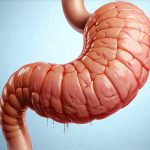Burping, technically known as eructation, is a perfectly natural bodily function. It’s how our bodies release excess air from the digestive system. We all do it – sometimes discreetly, sometimes not so much! However, when burping becomes frequent or excessive, particularly in relation to eating habits and digestive discomfort, it can be a signal that something isn’t quite right. Understanding the patterns associated with indigestion-related burping is key to recognizing potential issues and making informed choices about your health and well-being. It’s not just about the sound; it’s about when it happens, how often, and what other symptoms accompany it.
Many factors can contribute to increased burping, ranging from simple dietary choices to underlying digestive conditions. Often, it’s a transient issue easily addressed with lifestyle adjustments. But persistent or severe burping, especially when coupled with other symptoms like bloating, heartburn, abdominal pain, or nausea, warrants closer attention and potentially a conversation with a healthcare professional. This article will explore the nuances of indigestion-related burping patterns, helping you differentiate between normal occurrences and signals that might require further investigation. We’ll focus on recognizing these patterns and understanding their potential links to digestive discomfort, emphasizing self-awareness as a first step towards managing your well-being.
Understanding The Connection Between Indigestion And Burping
Indigestion, or dyspepsia, encompasses a range of symptoms – including bloating, heartburn, nausea, feeling full quickly, and, crucially, excessive burping. The link is straightforward: indigestion often involves the buildup of gas in the digestive tract. This excess gas can be produced through several mechanisms. Swallowing air (aerophagia) during eating or drinking is one source, but more commonly, it’s a byproduct of improper digestion itself. When food isn’t broken down effectively, bacteria in the gut ferment undigested particles, releasing gases like hydrogen, carbon dioxide, and methane. These gases need to be released, and burping offers a quick escape route.
The type of food we consume plays a significant role too. Certain foods are known gas producers – beans, broccoli, cabbage, onions, and carbonated beverages being prime examples. Eating large meals quickly can also contribute to increased air swallowing and inefficient digestion. Furthermore, underlying digestive conditions like Irritable Bowel Syndrome (IBS) or Gastroesophageal Reflux Disease (GERD) can exacerbate indigestion symptoms including burping. In these cases, the burping isn’t merely a consequence of food; it’s often linked to an ongoing imbalance in the digestive system. Recognizing the patterns in your digestion can be extremely helpful.
Recognizing that your burping is directly tied to meals and subsequent discomfort is crucial. Is it happening immediately after eating? Or hours later? Does it seem worse with particular foods? These observations provide valuable clues about potential triggers and allow for more targeted adjustments to diet and lifestyle. The timing of the burping, coupled with other symptoms, helps distinguish indigestion-related burping from other causes. If you notice consistent issues, consider recognizing the patterns to better understand your body’s reactions.
Common Burping Patterns Associated With Indigestion
Indigestion-related burping isn’t always a uniform experience. Different patterns can suggest different underlying issues or sensitivities. One common pattern is postprandial burping, which refers to excessive burping shortly after eating. This often occurs when the digestive system is overwhelmed, perhaps due to a large meal size or quickly consumed food. Another pattern involves prolonged burping, lasting for several minutes at a time. This might indicate more significant gas production and potentially slower digestion.
A third, and sometimes more concerning, pattern is frequent but small bursts of burping throughout the day, even when not eating. While still linked to indigestion, this could signal an underlying issue such as gastritis (inflammation of the stomach lining) or a sensitivity to certain foods that are continually irritating the digestive tract. It’s also important to note the presence of accompanying symptoms. Burping combined with heartburn suggests GERD; burping alongside bloating and abdominal pain might indicate IBS or food intolerance. Paying attention to the entire symptom picture – not just the burping itself – is essential for accurate self-assessment. This can be further complicated by restrictive dieting patterns, which may lead to imbalances.
Identifying Food Triggers Through Elimination Dieting
One effective way to pinpoint food triggers is through a carefully planned elimination diet. This involves removing suspected problematic foods from your diet for a period of time, then reintroducing them one at a time while monitoring for symptoms. Here’s how it works:
- Elimination Phase: Remove common gas-producing or irritating foods – dairy, gluten, caffeine, alcohol, artificial sweeteners, and highly processed foods are good starting points – for 2–3 weeks. Keep a detailed food diary to track everything you eat and any associated symptoms.
- Reintroduction Phase: Gradually reintroduce one eliminated food at a time, observing your body’s reaction over several days. If symptoms return, that food is likely a trigger.
- Documentation: Continue this process for each eliminated food, carefully documenting the results. This will help you identify specific foods that worsen your burping and digestive discomfort.
It’s important to note that elimination diets can be challenging and may require guidance from a registered dietitian or healthcare professional, especially if you have underlying health conditions. The goal is not to eliminate entire food groups permanently but to identify sensitivities and make informed dietary choices. A personalized approach based on your individual reactions is key. Understanding food tracking can also provide insights into your eating habits.
Managing Meal Size And Eating Habits
How we eat is just as important as what we eat. Large meals overwhelm the digestive system, leading to increased gas production and burping. Here are some strategies for managing meal size and eating habits:
- Eat smaller, more frequent meals throughout the day rather than three large ones.
- Chew your food thoroughly. This aids digestion and reduces air swallowing.
- Avoid rushing while eating. Take your time and savor each bite.
- Limit carbonated beverages and chewing gum, both of which introduce excess air into the digestive system.
- Sit upright while eating to aid gravity and proper digestion.
These simple adjustments can significantly reduce the burden on your digestive system and minimize burping. Consistent mindful eating practices are a powerful tool for managing indigestion. Consider keeping a food diary alongside these changes, noting how different eating habits impact your burping frequency and severity. If you find yourself struggling with this, consider low-fat meal patterns might play a role in digestion.
Exploring Over-The-Counter Remedies And When To Seek Professional Help
Several over-the-counter remedies can provide temporary relief from indigestion-related burping. Antacids neutralize stomach acid, reducing heartburn and potentially easing discomfort. Simethicone helps break up gas bubbles in the digestive tract. Digestive enzymes can aid in food breakdown, particularly if you suspect enzyme deficiencies. However, these are symptom management tools, not cures.
It’s crucial to seek professional medical help if your burping is persistent, severe, or accompanied by concerning symptoms such as: – Unintentional weight loss – Difficulty swallowing – Persistent vomiting – Blood in your stool – Severe abdominal pain These symptoms could indicate a more serious underlying condition that requires prompt diagnosis and treatment. A healthcare professional can accurately assess your situation, rule out other potential causes, and recommend appropriate interventions. Don’t hesitate to seek help if you’re concerned about your burping or digestive health – it’s always better to be safe than sorry. Additionally, recognize how weekend patterns might influence your overall digestion and well-being. Finally, remember that perfectionism can also affect digestive health.


















